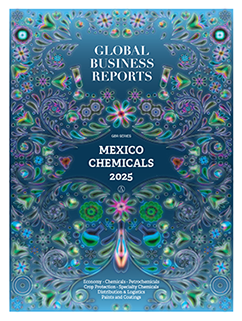
"Mexico's regulatory environment can be seen as a challenge, but clear regulations provide companies with a solid foundation for growth."
RELATED PUBLICATION
ARTICLES FROM THIS PUBLICATION
Erasmo Vázquez Almendárez
CEO, VAZAL CORPORATIVO JURÍDICO
Can you introduce Vazal Corporativo?
We focus on specialized legal and technical services for the chemical and mining industries, which are highly specialized sectors in Mexico, among other consulting services tailored to the needs of other industries. We have identified a significant niche and successfully supported companies aligning with the country's regulatory framework. Our firm has offices in San Luis Potosí, Mexico City, Guadalajara and Monterrey.
The chemical industry is complex, and its value chain is integral to nearly every other industry. As a firm specializing in this sector, we have learned the importance of understanding the operational and legal intricacies governing the industry. Our approach ensures that our clients are well-informed and compliant with local regulations to ensure sustainable growth. Mexico's regulatory environment can be seen as a challenge, but clear regulations provide companies with a solid foundation for growth. Contrary to some perceptions, Mexico's rules, although stricter compared to other countries in Latin America, are clear and facilitate long-term business stability.
How does Mexico's legal framework impact companies?
Mexico's legal framework, especially about the chemical industry, is influenced by its proximity to the US and the strong economic ties between the two countries. While some companies consider the regulations complex, they are an opportunity. Clear and robust regulatory structures protect the environment and public health, and help companies grow within a well-defined legal boundary. Many industries, especially the chemical sector, rely heavily on US regulations, and while this can seem burdensome at times, it also ensures that businesses operate at an internationally recognized standard. Despite some concerns about the complexity of these rules, this regulatory environment will ultimately lead to more significant growth and stability for Mexican businesses.
What challenges does the Mexican government face in regulating the chemical industry?
There is no doubt that Mexico's government needs to adjust its public policies to support the growth of the chemical industry better. In the past few years, we have seen an increase in regulations and some paralysis in the public sector regarding implementation, particularly with policies that mix environmental concerns with economic development. For example, some rules are well-meaning but can be overly cautious or unclear, creating delays in business operations and sometimes even stalling investments due to the lack of timely permits. To foster long-term growth in the chemical sector, policies must be more adaptable and well-supported by the private sector. Better coordination between the public and private sectors could help the chemical industry in Mexico grow exponentially over the next decade.
What are companies' main regulatory challenges with institutions like Cofepris?
Cofepris and Semarnat play crucial roles in regulating industries like chemicals, but issues relate to their ability to act promptly. The law sets clear response timelines, which are not always adhered to, leading to significant delays in critical operations. These institutions must become more agile and efficient, ensuring that companies receive timely responses to their requests and comply with environmental standards without unnecessary hindrances.
How have recent legal reforms impacted the chemical industry?
Recent judicial reforms in Mexico, particularly in the legal framework, cause concern. While changes in the law are generally beneficial, the way they are being implemented has created a sense of legal uncertainty. This uncertainty can prevent companies from making informed decisions about their operations, as they are unsure how new laws will affect them. This legal ambiguity is especially problematic in the chemical industry, where regulatory clarity is vital for businesses to comply with legal standards.











